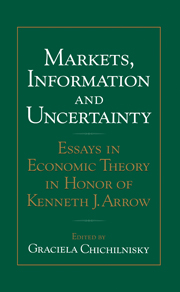Book contents
1 - Information and the organization of industry
Published online by Cambridge University Press: 05 December 2011
Summary
About 15 years ago, my friend, the distinguished sociologist Daniel Bell, suggested to me that I should consider an “information theory of value,” to play the role in the modern economy that the “labor theory of value” played in classical economics. I am afraid that I made light of the suggestion. I explained patiently, with the usual attitude of superiority of the economist to other social scientists, that the labor theory of value was supposed to explain relative prices and that information, however defined, could hardly play the same role. Surely goods did not exchange in proportion to their information content. I argued that in fact goods with high information content were likely to be very inexpensive, because information could be reproduced cheaply, even if the initial production was expensive; and every neoclassical economist knew that it was the marginal cost, the cost of reproduction, that is relevant.
There was nothing wrong with the specifics of my reply, but I had missed the essential point of Bell's comment. Facts are beginning to tell against my view. What is startling is that information is almost the exclusive basis for value in computer software and some other goods. These are extreme cases, but the role of information as a source of productivity and as a source of value is increasingly exemplified in many markets and is increasingly an important component of economic analysis. I therefore want to link two concepts, both indeed explored in the literature but neither fully satisfactorily: (1) the role of information as an economic commodity, and (2) the identity of firms as loci of knowledge and claims to wealth.
- Type
- Chapter
- Information
- Markets, Information and UncertaintyEssays in Economic Theory in Honor of Kenneth J. Arrow, pp. 19 - 25Publisher: Cambridge University PressPrint publication year: 1999
- 10
- Cited by



